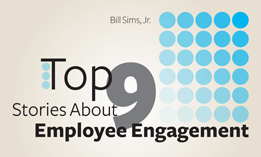The Great Motivational Debate
I’d just finished my workshop at the national meeting of the American Society of Safety Engineers. After my presentation, I was approached by a senior consultant with one of the biggest behavioral consulting firms; he immediately hit me with a really heavy behavioral question….
“Aren’t you worried about robbing people of their intrinsic motivation by giving them gifts like IPODS and other tangible reinforcers?” he asked, smiling slightly.
“What about the jobs where there are NO intrinsic reinforcers?” I responded. He stared back at me, puzzled.
For instance, what if I work at a theme park and the desired job behavior is for me to smile and make eye contact with guests, or voluntarily help co-workers (a core trait of engaged employees). I do this for awhile, but my supervisor never says “Thanks,” or notices my extra effort. What happens to INTRINSIC motivation then?
The consultant’s theory of employee motivation had sadly met the real world of business—whether he liked it or not. The world of work positively and negatively reinforces us 24×7. How much intrinsic reinforcement can you feel when your good work is ignored?
I Search for Answers
I felt like I held my own in this discussion, but it deepened my curiosity about the reason psychologists and consultants had disagreements about the way employees respond to extrinsic reinforcement. I asked my friends in the behavioral world to help me understand this controversy.
They told me to read a book by Alfie Kohn, who I learned is kind of like Darth Vader to Behaviorists….he feels that intrinsic human motivation is where the rubber hits the road; he takes a bunch of intellectual shots at BF Skinner and other behaviorists.
Cool! So, there’s this whole great debate about why we do what we do. It seems that the battle between the Cognitive psychologists and the Behaviorists has raged for quite awhile. And ne’er the twain shall meet.
For those of you who want the short version of the Cognitive vs. Behaviorism Wars, here it goes…
Behaviorists, followers of BF Skinner, believe that everything we do is a result of what happens to us after we do it. I’m thirsty, so I open up my water bottle and take a sip. I can’t see, so I turn the lights on.
They argue (rightfully so) that if the lights didn’t come on (positive, immediate & certain consequences or PIC) then pretty soon I’d forget the light switch and carry a flashlight. And, they are right. The other neat thing about behaviorism is that we can directly observe, measure & quantify behaviors, because unlike thoughts, we can see them.
The behaviorists believe that extrinsic reinforcement is not only a good thing, but it is the best way to motivate people. If you want better performance and behavior change—you need to make sure the consequences are positive. They believe in extrinsic motivation.
Now the Other View
Cognitive psychologists believe that thinking plays a bigger role in why people behave. They talk about intrinsic motivation and recoil at the thought that human behavior is simply caused by consequences. What about expectations and goals?
Alfie Kohn, in his book, Punished by Rewards, pours out some very passionate arguments about how giving people praise, rewards and gifts really robs them of their ability to do their best. He says it takes away their intrinsic motivation.
He cites studies with school kids who earn pizza by reading books. True, the pizza incentive increased performance, but once you take it away, the kids have less desire to read than they did in the beginning. The study implies that kids will read more if you let them do it because they want to, not because you reward them. What if they don’t want to?
Alfie Kohn advocates the removal of verbal praise and rewards from schools, parenting and management.
I felt kind of like Luke Skywalker while reading Alfie’s book. ….I was really worried, and felt the pull of the Dark Side.
Could it be that we are really hurting ourselves by rewarding and reinforcing good behaviors?
The Rewards of Rewarding
Then I thought about my own career as a sales person (I noted that the cognitive studies chose school kids as their subjects, and steered a wide path around sales people.)
The sales incentive industry is like the green giant of the incentive world—billions of dollars are spent rewarding sales people with trips, IPods, golf clubs, and cash. Over the last 70 years, they have taught us a couple of interesting things….
Even when salespeople are compensated with money for every sale (a performance bonus, commission, extrinsic reinforcer, etc.) they WILL STILL WORK HARDER AND SELL MORE WHEN AN ADDITIONAL INCENTIVE IS PRESENTED.
What about kids and pizza? I asked my other expert, my daughter Carli. “Remember how you could read books in elementary school to get pizza Carli?” I asked…
“Sure do, dad. It was fun.”
“So did getting pizza make you want to read books less?”
“No, and you still owe me a pizza dad. (I had forgotten to cash in Carli’s pizza coupon, and so I guess I provided a really big NIC (negative, immediate, certain) experience for her.
So, did pizza make Carli less interested in reading? According to her, she felt stifled because the books that were on her reading list were boring. They didn’t resonate with her passion: horses.
Carli went on to say that if she could have read every horse book in the world and been rewarded for it, she would have.
Whether it’s a Medal of Honor, Purple Heart, or Mary Kay’s pink Cadillac awards, humans are hardwired to respond to tangible and social extrinsic reinforcement.
Why does the Bill Sims Company advocate the use of tangibles? Because people it makes people feel appreciated and their increased performance shows it.
You can follow any responses to this entry through the RSS 2.0 feed. You can leave a response, or trackback from your own site.
